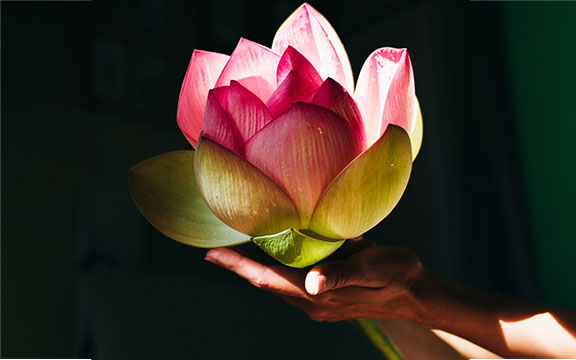
Photo by Olga Nayda via Unsplash
What is Yoga? In simple words: to remain with ease and peace. You might wonder what that ease is. I am talking about that ease, which you disturbed and then called yourself dis‑eased. Even to become a diseased person you should have had ease before, is it not so? If you haven’t had ease how can you disturb it? So what we say in the name of Yoga is to not disturb your natural condition of ease.
And the same principle applies to the mind: do not disturb the peace; let your mind be peaceful. It’s as simple as that. Anything that you would do to avoid disturbing the ease of the body and peace of the mind could be called Yoga. The practice of Yoga is not about a special technique, rather the aim of practice is more important. If your aim is to maintain your ease and peace, then that is Yoga.
Keeping the right attitude will make everything Yoga. How to cultivate the right attitude? By asking yourself: Will I disturb my ease by doing this? If the answer is yes, then stay away from that. There are many things that can disturb our peace and ease. And that is the reason we try to keep some discipline, such as staying away from certain types of food, from smoking, from liquor, from recreational drugs, from over-straining our senses by overindulging. We don’t deny the right kind of enjoyment. The senses are given to us so we can enjoy life. And we will enjoy more when we don’t overindulge. That is why the Buddha taught the middle path. Don’t go to extremes. We should have that kind of discipline in life. Everything that thrives has its own discipline. We see this throughout Mother Nature. Do animals overeat? No. Do they smoke? No, so, the only exception seems to be the human beings.
The Cosmic Intelligence, when It expressed Itself in the form of human beings, gave more freedom to Itself. That’s why the Bible said that God gave Adam and Eve the freedom to choose to eat or not eat the fruit—though God said to not eat it. So it is the human species that has the freedom to do the right or to do the wrong. And we should always see that we are doing the right because by doing the wrong we are hurting ourselves and others.
This is what Yoga essentially teaches: self‑reflection and self-refinement. Practices like Hatha Yoga helps us to discipline the body and that has many benefits of its own. Hatha Yoga helps us to eliminate toxins in the body, to bring a deeper relaxation, and increase prana (vital energy). When you take in a lot of prana, you can become more immune to many of the outside forces that could affect you. That’s very important. In fact, a yogi should be healthier and happier, stronger and more immune to any undesirable influences. It’s only a good yogi who can better enjoy the world. Sometimes people think that being a yogi means that you have to go into a cave and retreat from life. But I tell you, if you really want to enjoy the life, become a yogi. Then you will know how much to enjoy and where the limit is.
Many people begin with the idea of enjoying and they end up in problems because they don’t know the limit; they get carried away because they don’t have control over their own mind. In the name of enjoying, if you overeat, are you going to enjoy? You will have the stomach problem. The real enjoyment of life comes when you know the limitations, know your capacity, which requires having good control over the mind.
The mind should not dominate you, you should be the master. That is what Yoga is all about: to make you the master of your mind and body. So your Hatha Yoga, pranayama, meditation, are all to help you function in a balanced way. And we should take enough time for that. Look within. Analyze your own mind. What kind of thoughts do you allow to come in? Are they helpful or disturbing? Everybody should take time for that. If not both morning and evening, at least one time in the day.
So take time to sit, reflect, and meditate. This will help keep the mind clean. Pinpoint any selfish thought that arises and recognize that it will certainly disturb your mind. Remember, a selfish person can never be happy. And what do I mean by selfish? Doing things expecting something in return: “I won’t do it if I don’t get this or that. I only care how I feel and what others are doing for me.” Those who are constantly blaming others, feeling jealous about what others may have, thinking only of themselves, can never be happy.
Instead, cultivate the attitude: I am here to serve others and I enjoy doing that. Just look at an apple tree. How freely it offers its fruits. Ask a tree: “How many fruits did you produce?” The tree might tell you: “Oh, several hundreds.” Then ask the tree, “How many did you eat?” What will the tree tell you? “None.” The minute we forget that we are the Spirit and instead identify ourselves as the body and mind, then we put ourselves in a lot of difficulty and suffering. You are the Spirit. That is the teaching of Yoga and that is the aim of Yoga: to know your Self; to remember who you are. Know the happiness, peace, and contentment that is the essence of the True Self—and that this is the essence of everyone.
Once you experience this truth, it will take care of everything in your life. I wish you all peace and joy, health and happiness. Om Shanti.

